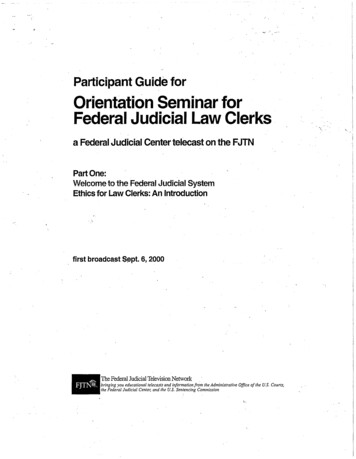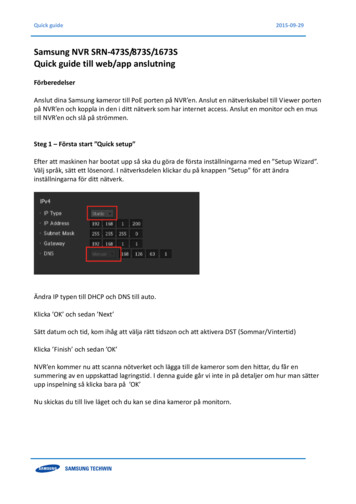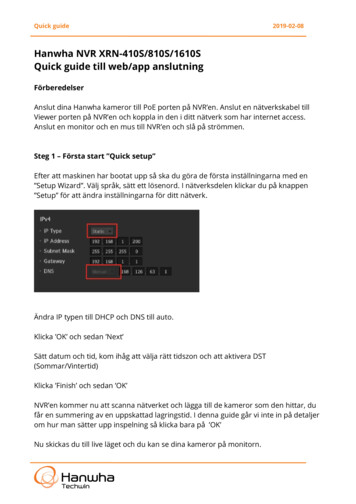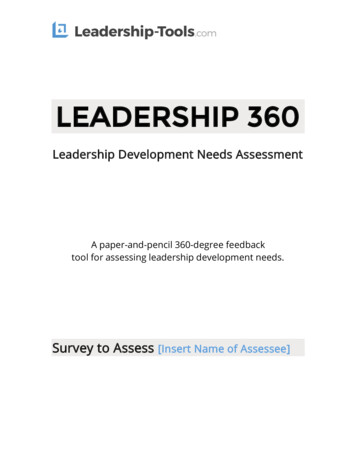
Transcription
Participant Guide forOrientation Seminar forFederal Judicial Law Clerksa Federal Judicial Center telecast on the FJTNPart One:Welcome to the Federal Judicial SystemEthics for Law Clerks: An Introductionfirst broadcast S pt. 6, 2000The Federal Judicial Television Networkbringing you educational telecasts and information from the Administrative Office of the U.S. Courts,the Federal Judicial Center, and the U.S. Sentencing Commission ,.,
Participant Guide ContentsIntroductionMaterials to accompany Part OneWelcome to the Federal Judicial System (outline)Ethics for Law Clerks: An Introduction (outline)Code of Conduct for Judicial EmployeesSelections from the Compendium of Selected Opinions from the CommitteeEvaluation form
Participant Guide forOrientation Seminar forFederal Judicial Law Clerksa Federal Judicial Center telecast on the FJTNPart One:Welcome to the Federal Judicial SystemEthics for Law Clerks: An Introductionfirst broadcast Sept. 6, 2000The Federal Judicial Television Networkbringing you educational telecasts and information from the Administrative Office of the U.S. Courts,the Federal Judicial Center. and the U.S. Sentencing Commission
IntroductionWelcome to the Federal Judicial Center's Orientation Seminar for Federal JudicialLaw Clerks. The Center is broadcasting this two-part seminar over the Federal Judicial Television Network (FJTN). This participant guide contains materials to helpsupplement the broadcasts. Some of the materials also may serve as useful resourcesfor your future reference.Part One begins with Welcome to the Federal Judicial System, with Hon. Fern M.Smith, Director of the Federal Judicial Center. Part One continues with Ethics forLaw Clerks: An Introduction. This segment, which the Center produced in consultation with the Judicial Conference Committee on Codes of Conduct, examines anumber of ethical issues drawn from the experiences of former law clerks. Hon.Carol B agley Amon, chair of the committee, introduces the program. For your reference, this guide contains (1) an outline of the areas in which ethical issues are mostlikely to arise for law clerks and the sources of authority governing those areas; (2)a collection of references to law clerks from the Compendium of Selected Opinionsfrom the Committee; and (3) a copy of the Code of Conduct for Judicial Employees.Part Two addresses legal writing and editing. The instructors, Stephen V.Armstrong, director of professional development at the law firm of Paul, Weiss, andTimothy P. Terrell, professor of law at Emory University School of Law, stress writing effective introductions, providing context before detail, and making the structure of a piece of writing explicit as a means of helping law clerks write and editmore efficiently, effectively, and clearly. The written materials for this program contain examples that Mr. Armstrong and Prof. Terrell will refer to throughout theirpresentation.Finally, this participant guide contains an evaluation form for the broadcasts. Pleasecomplete the form and fax it back to us at the number shown on the form. We valueyour feedback, and we use your comments to ascertain how we can make our programs most effective for you.1
Welcome to the Federal Judicial SystemThe following is an outline of the presentation Welcome to the Federal JudicialSystem, by Hon. Fern M. Smith, director of the Federal Judicial Center, which opensPart One of Orientation Seminar for Federal Law Clerks.Federal Judicial Center ResourcesA Center publications1. Chambers Handbookfor Judges Law Clerks and Secretariesa. An overview of chambers operations and the work of thefederal courtsb. It also contains a basic description of the civil, criminal, bankruptcy, and appellate litigation processesc. A helpful analysis of legal research and writing techniques2. Judicial Writing Manuala. This concise manual encourages you to think critically aboutwriting3. Other Center publications for district and magistrate judgesa. Benchbookfor U.S. District Court Judgesb. Manual on Recurring Problems in Criminal Trialsc. Manualfor Complex Litigation, Thirdd. Manualfor Litigation Management and Cost and Delay Reductione. Reference Manual on Scientific Evidencef. Guideline Sentencing: An Outline ofAppellate Case Law on Selected Issues, a cumulative outline of cases reported in thecenter's Guideline Sentencing Update periodical4. All of these publications should be in district and magistratejudges' chambers libraries; many will also be in chambers of appellate and bankruptcy judges. If not, call the Information ServicesOffice,(202) 502-4153B. Other publications1. Clerks to appellate judges should read A Primer on the Jurisdictionofthe U.S. Courts ofAppeals2. Bankruptcy judges' law clerks will find helpful the Case Management Manual for u.s. Bankruptcy Judges, which the Center and theAO prepared under the direction of the Subcommittee on CaseManagement of the Judicial Conference's Committee on the Ad.ministration of the Bankruptcy System3. Monographs on substantive and procedural topicsa. Attorneys' fee litigationb. Summary judgment2
Outline of Welcome to the Federal Judicial Systemc. Copyright lawd. Patent law and practicee. Business bankruptcyf. Securities litigationg. Employment discriminationh. Civil rights litigationC. Video programs1. Introducing The Federal Courtsa. Five-part series helps new court employees better understandtheir jobs and the important role they play in the effectiveadministration of justiceb. Program One provides an overview of the federal court system.c. Remaining four programs dramatize hypothetical cases illustrating the steps in the criminal, civil, appellate, and bankruptcy' processes2. Video orientation programs for new appellate, district, magistrate,and bankruptcy judgesa. Provide more advanced instruction(i) Substantive and procedural topics(ii) Chambers and case managementb. Designed for newly appointed judges to watch shortly aftertheir appointmentD. Catalogs of publications and audiovisual media programs containcurrent offeringsE. FJC website on the DCN3
Ethics for Law Clerks: An IntroductionEthicsfor Law Clerks: An Introduction examines ethical issues that may arise in theseven areas shown below. This outline identifies the sources of authority for eachethical area. Law clerks should always consult with their judge about potential ethical issues.I. Maintaining ConfidentialityCanon 3D, Code of Conduct for Judicial Employees (source of all canonscited in this outline)local court or bar rulesIT. Conflicts of InterestCanon 3FITI. Outside Law-Related ActivitiesCanon 4DIV. Outside Political ActivitiesCanon 5Advisory Opinion 92V. Outside Professional, Social, and Community ActivitiesCanon 4VI. Gifts and HonorariaCanon4CEthics Reform Act regulations concerning giftsEthics Reform Act regulations concerning outside earned income, honoraria,and outside employmentVIT. Future EmployersCommittee on Codes of Conduct Advisory Opinions Nos. 74, 81, 83Resources cited above in I. Maintaining Confidentiality, II. Conflictsof Interest, VI. Gifts
Code of Conduct for Judicial EmployeesIntroductionThis Code of Conduct applies to all employees of the Judicial Branch except Justices; judges; and employees of the United States Supreme Court, the Administrative Office of the United States Courts, the Federal Judicial Center, the SentencingCommission, and Federal Public Defender offices.! As used in this code in canons3F(2)(b), 3F(5), 4B(2), 4C(1), and 5A, a member of ajudge's personal staff meansa judge's secretary, a judge's law clerk, and a courtroom deputy clerk or court reporter whose assignment with a particular judge is reasonably perceived as being. comparable to a member of the judge's personal staff.2Contractors and other nonemployees who serve the Judiciary are not covered bythis code, but appointing authorities may impose these or similar ethical standardson such nonemployees, as appropriate.The Judicial Conference has authorized its Committee on Codes of Conduct torender advisory opinions concerning the application and interpretation of this code.Employees should consult with their supervisor and/or appointing authority for guidance on questions concerning this code and its applicability before a request for anadvisory opinion is made to the Committee on Codes of Conduct. In assessing thepropriety of one's proposed conduct, a judicial employee should take care to consider all relevant canons in this code, the Ethics Reform Act, and other applicablestatutes and regulations 3 (e.g., receipt of a gift may implicate canon 2 as well ascanon 4C(2) and the Ethics Reform Act gift regulations). Should a question remainafter this consultation, the affected judicial employee, or the chief judge, supervisor,or appointing authority of such employee, may request an advisory opinion from theCommittee. Requests for advisory opinions may be addressed to the Chairman ofthe Committee on Codes of Conduct in care' of the General Counsel, Administrati veOffice of the United States Courts, One Columbus Circle, N.E., Washington, D.C.20544.Adopted September 19, 1995 by the Judicial Conference of the United StatesEffective January 1, 19961. Justices and employees of the Supreme Court are subject to standards established by the Justices of that Court. Judges are subject to the Code of Conduct for United States Judges. Employees ofthe AO and the FJC are subject to their respective agency codes. Employees of the Sentencing Commission are subject to standards established by the Commission. Federal public defender employeesare subject to the Code of Conduct for Federal Public Defender Employees. When Actually Employed (yVAE) employees are subject to canons 1,2, and 3 and such other provisions of this code asmay be determined by the appointing authority.2. Employees who occupy positions with functions and responsibilities similar to those for aparticular position identified in this code should be guided by the standards applicable to that position, even if the position title differs. When in doubt, employees may seek an advisory opinion as tothe applicability of specific code provisions.3. See Guide to Judiciary Policies and Procedures, Volume II, Chapter VI, Statutory and Regulatory Provisions Relating to the Conduct of Judges and Judicial Employees.5
Code of Conduct for Judicial EmployeesCanonlA judicial employee should uphold the integrity and independence of thejudiciary and of the judicial employee's officeAn independent and honorable Judiciary is indispensable to justice in our society. Ajudicial employee should personally observe high standards of conduct so that theintegrity and independence of the Judiciary are preserved and the judicial employee'soffice reflects a devotion to serving the public. Judicial employees should requireadherence to such standards by personnel subject to their direction and control. Theprovisions of this code should be construed and applied to further these objectives.The standards of this code shall not affect or preclude other more stringent standards required by law, by court order, or by the appointing authority.Canon 2A judicial employee should avoid impropriety and the appearance of impropriety in all activitiesA judicial employee should not engage in any activities that would put into questionthe propriety of the judicial employee's conduct in carrying out the duties of theoffice. Ajudicial employee should not allow family, social, or other relationships toinfluence official conduct or judgment. A judicial employee should not lend theprestige of the office to advance or to appear to advance the private interests ofothers. A judicial employee should not use public office for private gain.Canon 3A judicial employee should adhere to appropriate standards in performingthe duties of the officeIn performing the duties prescribed by law, by resolution of the Judicial Conferenceof the United States, by court order, or by the judicial employee's appointing authority, the following standards apply:A.A judicial employee should respect and comply with the law and these canons. A judicial employee should report to the appropriate supervising authority any attempt to induce the judicial employee to violate these canons.Note: A number of criminal statutes of general applicability govern federalemployees' performance of official duties. These include: 18 U.S.c. § 201 (bribery of public officials and witnesses); 18 U.S.c. § 211 (acceptance or solicitation to obtain appointive publicoffice); 18 U.S.C. § 285 (taking or using papers relating to government claims); 18 U.S.C. § 287 (false, fictitious, or fraudulent Claims against the government); 18 U.S.C. § 508 (counterfeiting or forging transportation requests); 18 U.S.C. § 641 (embezzlement or conversion of government money, property, or records);6
Code of Conduct for Judicial Employees 18 U.S.C. § 643 (failing to account for public money);. 18 U.S.C. § 798 and 50 U.S.C. § 783 (disclosure of cl,assified information); 18 U.S.c. § 1001 (fraud or false statements in a government matter); 18 U.S.c. § 1719 (misuse of franking privilege); 18 U.S.C. § 2071 (concealing, removing, or mutilating a public record); 31 U.S.C. § 1344 (misuse of government vehicle); 31 U.S.c. § 3729 (false claims against the government).In addition, provisions of specific applicability to court officers include: 18 U.S.c. §§ 153, 154 (court officers embezzling or purchasing propertyfrom bankruptcy estate); 18 U.S.c. § 645 (embezzlement and theft by court officers); 18 U.S.C. § 646 (court officers failing to deposit registry moneys); 18 U.S ,c. § 647 (receiving loans from registry moneys from court officer),This is not a comprehensive listing but sets forth some of the more significantprovisions with which judicial employees should be familiar.B.A judicial employee should be faithful to professional standards and maintain competence in the judicial employee's profession.C.A judicial employee should be patient, dignified, respectful, and courteousto all persons with whom the judicial employee deals in an official capacity,including the general public, and should require similar conduct of personnel subject to the judicial employee's direction and control. A judicial employee should diligently discharge the responsibilities of the office in a prompt,efficient, nondiscriminatory, fair, and professional manner. A judicial employee should never influence or attempt to influence the assignment of cases,or perform any discretionary or ministerial function of the court in a mannerthat improperly favors any litigant or attorney, nor should a judicial employee imply that he or she is in a position to do so.D.A judicial employee should avoid making public comment on the merits of apending or impending action and should require similar restraint by personnel subject to the judicial employee's direction and control. This proscription does not extend to public statements made in the course of official duties or to the explanation of court procedures. A judicial employee shouldnever disclose any confidential information received in the course of officialduties except as required in the performance of such duties, nor should ajudicial employee employ such information for personal gain. A former judicial employee should observe the same restrictions on disclosure ofconfidential information that apply to a current judicial employee, except asmodified by the appointing authority.7
Code of Conduct for Judicial EmployeesE.A judicial employee should not engage in nepotism prohibited by law.Note: See also 5 U.S.c. § 3110 (employment of relatives); 28 U.S.c. § 458(employment of judges , relatives).F.Conflicts of Interest.(1) A judicial employee should avoid conflicts of interest in the performanceof official duties. A conflict of interest arises when a judicial employeeknows that he or she (or the spouse, minor child residing in the judicialemployee's household, or other close relative of the judicial employee)might be so personally or financially affected by a matter that a reasonable person with knowledge of the relevant facts would question thejudici l employee's ability properly to perform official duties in an impartial manner.(2) Certain judicial employees, because of their relationship to a judge orthe nature of their duties, are subject to the folloWing additional restrictions:(a) A staff attorney or law clerk should not perform any official duties inany matter with respect to which such staff attorney or law clerkknows that:(i) he or she has a personal bias or prejudice concerning a party, orpersonal knowledge of disputed evidentiary facts concerning theproceeding;(ii) he or she served as lawyer in the matter in controversy, or a lawyer with whom he or she previously practiced law had served(during such association) as a lawyer concerning the matter, orhe, she, or such lawyer has been a material witness;(iii) he or she, individually or as a fiduciary, or the spouse or minorchild residing in his or her household, has a financial interest inthe subject matter in controversy or in a party to the proceeding;(iv)he or she, a spouse, or a person related to either within the thirddegree of relationship, 4 or the spouse of such person (A) is a partyto the proceeding, or an officer, director, or trustee of a party;(B) is acting as a lawyer in the proceeding; (C) has an interestthat could be substantially affected by the outcome of the proceeding; or (D) is likely to be a material witness in the proceeding;(v) he or she has served in governmental employment and in suchcapacity participated as counsel, advisor, or material witness concerning the proceeding or has expressed an opinion concerningthe merits of the particular case in controversy.4. As used in this code, the third degree of relationship is calculated according to the civil lawsystem to include the following relatives: parent, child, grandparent, grandchild, great grandparent,great grandchild, brother, sister, aunt, uncle, niece, and nephew.8
Code of Conduct for Judicial Employees(b) A secretary to a judge, or a courtroom deputy or court reporter whoseassignment with a particular judge is reasonably perceived as beingcomparable to a member of the judge's personal staff, should notperform any official duties in any matter with respect to which suchsecretary, courtroom deputy, or court reporter knows that he or she, aspouse, or a person related to either within the third degree of relationship, or the spouse of such person (i) is a party to the proceeding,or an officer, director, or trustee of a party; (ii) is acting as a lawyerin the proceeding; (iii) has an interest that could be substantially affected by the outcome of the proceeding; or (iv) is likely to be amaterial witness in the proceeding; provided, however, that whenthe foregoing restriction presents undue hardship, the judge may authorize the secretary, courtroom deputy, or court reporter to participate in the matter if no reasonable alternative exists and adequatesafeguards are in place to ensure that official duties are properly performed. In the event the secretary, courtroom deputy, or court reporter possesses any of the foregoing characteristics and so advisesthe judge, the judge should also consider whether the Code of Conduct for United States Judges may require the judge to recuse.(c) A probation or pretrial services officer should not perform any officialduties in any matter with respect to which the probation or pretrialservices officer knows that:" ":(i) he or she has a personal bias or prejudice concerning a party;(ii) he or she is related within the third degree of relationship to aparty to the proceeding, or to an officer, director, or trustee of aparty, or to a lawyer in the proceeding;(iii)he or she, or a relative within the third degree of relationship,has an interest that could be substantially affected by the outcome of the proceeding.(3) When a judicial employee knows that a conflict of interest may be presented, the judicial employee should promptly inform his or her appointing authority. The appointing authority, after determining that a conflictor the appearance of a conflict of interest exists, should take appropriatesteps to restrict the judicial employee's performance of official duties insuch matter so as to avoid a conflict or the appearance of a conflict ofinterest. Ajudicial employee should observe any restrictions imposed byhis or her appointing authority in this regard.(4)A judicial employee who is subject to canon 3F(2) should keep informedabout his or her personal, financial and fiduciary interests and make areasonable effort to keep informed about such interests of a spouse orminor child residing in the judicial employee's household.(5) A member of ajudge's personal staff should inform the appointing judgeof any circumstance or activity of the staff member that might serve as a9
Code of Conduct for Judicial Employeesbasis for disqualification of either the staff member or the judge, in amatter pending before the judge.Canon 4In engaging in outside activities, a judicial employee should avoid the risk ofconflict with official duties, should avoid the appearance of impropriety, andshould comply with disclosure requirementsA. Outside Activities. A judicial employee's activities outside of official dutiesshould not detract from the dignity of the court, interfere with the performance of official duties, or adversely reflect on the operation and dignity ofthe court or office the judicial employee serves. Subject to the foregoingstandards and the other provisions of this code, a judicial employee mayengage in such activities as civic, charitable, religious, professional, educational, cultural, avocational, social, fraternal, and recreational activities, andmay speak, write, lecture, and teach. If such outside activities concern thelaw, the legal system, or the administration of justice, the judicial employeeshould first consult with the appointing authority to determine whether theproposed activities are consistent with the foregoing standards and the otherprovisions of this code.B.Solicitation of Funds. A judicial employee may solicit funds in connectionwith outside activities, subject to the following limitations:(1) A judicial employee should not use or permit the use of the prestige ofthe office in the solicitation of funds.(2) A judicial employee should not solicit subordinates to contribute fundsto any such activity but may provide information to them about a generalfund-raising campaign. A member of a judge's personal staff should notsolicit any court personnel to contribute funds to any such activity undercircumstances where the staff member's close relationship to the judgecould reasonably be construed to give undue weight to the solicitation.(3) A judicial employee should not solicit or accept funds from lawyers orother persons likely to come before the judicial employee or the court oroffice the judicial employee serves, except as an incident to a generalfund-raising activity.C. Financial Activities.(1) A judicial employee should refrain from outside financial and businessdealings that tend to detract from the dignity of the court, interfere withthe proper performance of official duties, exploit the position, or associate the judicial employee in a substantial financial manner with lawyersor other persons likely to come before the judicial employee or the courtor office the judicial employee serves, provided, however, that court reporters are not prohibited from providing reporting services for compensation to the extent permitted by statute and by the court. A member of a10
Code of Conduct for Judicial Employeesjudge's personal staff should consult with the appointing judge concerning any financial and business activities that might reasonably be inter-,preted as violating this code and should refrain from any activities thatfail to conform to the foregoing standards or that the judge concludesmay otherwise give rise to an appearance of impropriety.(2) A judicial employee should not solicit or accept a gift from anyone seeking official action from or doing business with the court or other entityserved by the judicial employee, or from anyone whose interests may besubstantially affected by the performance or nonperformance of officialduties; except that a judicial employee may accept a gift as permitted bythe Ethics Reform Act of 1989 and the Judicial Conference regulationsthereunder. A judicial employee should endeavor to prevent a memberof a judicial employee's family residing in the household from solicitingor accepting any such gift except to the extent that a judicial employeewould be permitted to do so by the Ethics Reform Act of 1989 and theJudicial Conference regulations thereunder.Note: See 5 U.S.c. § 7353 (gifts to federal employees). See also 5 U.S.c.§ 7342 (foreign gifts); 5 U.S.c. § 7351 (gifts to superiors).(3) A judicial employee should report the value of gifts to the extent a reportis required by the Ethics Reform Act, other applicable law, or the Judicial Conference of the United States.Note: See 5 U.S.c. app. 6, §§ 101 to 111 (Ethics Reform Act financial disclosure provisions).(4) During judicial employment, a law clerk or staff attorney may seek andobtain employment to commence after the completion of the judicialemployment. However, the law clerk or staff attorney should first consult with the appointing authority and observe any restrictions imposedby the appointing authority. If any law firm, lawyer, or entity with whoma law clerk or staff attorney has been employed or is seeking or hasobtained future employment appears in any matter pending before theappointing authority, the law clerk or staff attorney should promptly bringthis fact to the attention of the appointing authority.D.Practice of Law. A judicial employee should not engage in the practice oflaw except that a judicial employee may act pro se, may perform routinelegal work incident to the management of the personal affairs of the judicialemployee or a member of the judicial employee's family, and may providepro bono legal services in civil matters, so long as such pro se, family, or probono legal work does not present an appearance of impropriety, does nottake place while on duty or in the judicial employee's workplace, and doesnot interfere with the judicial employee's primary responsibility to the officein which the judicial employee serves, and further provided that:11
Code of Conduct for Judicial Employees(1) in the case of pro se legal work, such work is done without compensation (other than such compensation as may be allowed by statute or courtrule in probate proceedings);(2) in the case of family legal work, such work is done without compensation (other than such compensation as may be allowed by statute or courtrule in probate proceedings) and does not involve the entry of an appearance in a federal court;(3) in the case of pro bono legal services, such work (a) is done withoutcompensation; (b) does not involve the entry of an appearance in anyfederal, state, or local court or administrative agency; (c) does not involve a matter of public controversy, an issue likely to come before thejudicial employee's court, or litigation against federal, state or local government; and (d) is reviewed in advance with the appointing authority todetermine whether the proposed services are consistent with the foregoing standards and the other provisions of this code.Judicial employees may also serve as uncompensated mediators or arbitratorsfor nonprofit organizations, subject to the standards applicable to pro bonopractice of law, as set forth above, and the other provisions of this code.A judicial employee should ascertain any limitations imposed by the appointing judge or the court on which the appointing judge serves concerning thepractice of law by a former judicial employee before the judge or the court andshould observe such limitations after leaving such employment.Note: See also 18 U.S.c. § 203 (representation in matters involving the UnitedStates); 18 U.S.c. § 205 (claims against the United States); 28 U.S.C. § 955(restriction on clerks of court practicing law).E.Compensation and Reimbursement. A judicial employee may receive compensation and reimbursement of expenses for outside activities provided thatreceipt of such compensation and reimbursement is not prohibited or restricted by this code, the Ethics Refonil Act, and other applicable law, andprovided that the source or amount of such payments does not influence orgive the appearance of influencing the judicial employee in the performanceof official duties or otherwise give the appearance of impropriety. Expensereimbursement should be limited to the actual cost of travel, food, and lodging reasonably incurred by a judicial employee and, where appropriate tothe occasion, by the judicial employee's spouse or relative. Any payment inexcess of such an amount is compensation.A judicial employee should make and file reports of compensation and reimbursement for outside activities to the extent prescribed by the Ethics Reform Act, other applicable law, or the Judicial Conference of the UnitedStates.12
Code of Conduct for Judicial EmployeesNotwithstanding the above, a judicial employee should not receive any salary, or any supplementation of salary, as compensation for official government services from any source other than the United States, provided, however, that court reporters are not prohibited from receiving compensation forreporting services to the extent permitted by statute and by the court.Note: See 5 U.S.C. app. 6, §§ 101 to 111 (Ethics Reform Act fin mcial disclosure provisions); 28 U.S.C. § 753 (court reporter compensation). See also5 U.S.C. app. 7, §§ 501 to 505 (outside earned income and employment).Canon 5A judicial employee should refrain from inappropriate
The following is an outline of the presentation Welcome to the Federal Judicial System, by Hon. Fern M. Smith, director of the Federal Judicial Center, which opens Part One of Orientation Seminar for Federal Law Clerks. Federal Judicial Center Resources A Center publications 1. Chambers Handbookfor Judges Law Clerks and Secretaries a.










